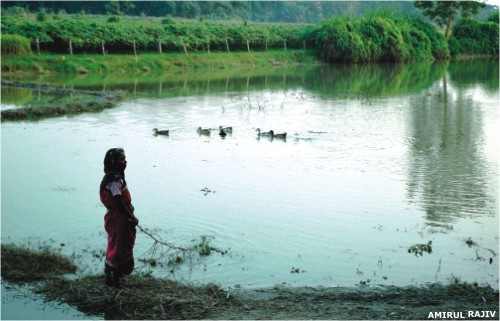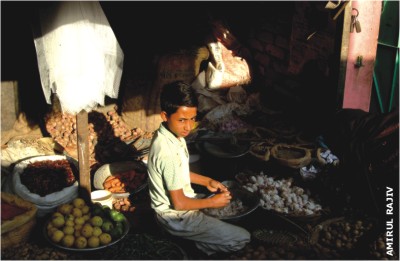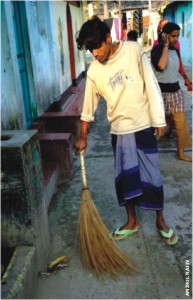
Inside
|
Looking forward to a pro-poor budget Now is the time to ensure economic security for all, especially those at the margins, argues Atiur Rahman
The upcoming budget will be announced in an exceptional environment this year. The budget is a fiscal act and normally gets passed in a parliament. This year the situation is different, hence a legal provision has to be made to get the budget legitimised. If the people's support for the government remains as it is now, this may not be a difficult problem. It is in this context that the budget makers have to make an effort to solicit people's opinion on the kind of the budget they want. The role of civil society, including the media, is, therefore, paramount in mobilizing public opinion for a people-friendly budget. Both income and human poverty have decreased in recent years. Reduction of income poverty, measured by Cost of Basic Needs (CBN) method, was one percentage point during 1990s, and accelerated in the later years. Human poverty, measured in terms of deprivation in health and education has also decreased. But wide variation in food energy intake has been found among the regions. Northern Bangladesh is still the most deprived region in Bangladesh. Living conditions are even worse in ecologically vulnerable areas like chars and monga-prone areas in that region. That deprivation in economic provisioning increased can be seen from the higher rate of unemployment, 4.3 % in 2002-03 compared to 3.5 % in 1999-00. Underemployment also increased to 37.6 % from 16.6% during this period. Significant disparity between men and women in terms of engagement in economic activities has also been noted. About 83% men and 25% women were unemployed, according to the latest labour force survey. Income inequality (measured by Gini Coefficient) has been increasing day by day. Inflation, unemployment and poverty Increased subsidy does not mean increased welfare of small and marginal farmers. Subsidy on fertiliser largely goes into the pockets of dealers and traders, the majority of whom are indeed influential persons. They artificially increase the price of fertiliser when demand appears to be high, and extract the benefits of the subsidy. The subsidy given to the pump owners in terms of lower cost of electricity does not reach the poor farmers, either. This means reduced productivity, higher prices of food items, and increased misery of the poor, who are the majority in the agriculture sector. Yet, they are the ones who have made Bangladesh nearly self-sufficient in food. Social protection Pro-poor growth and agriculture Support for agriculture and poultry and fish farming has to be strengthened. Higher subsidy is needed on diesel because the majority of boro-cultivating farmers depend on diesel-supported irrigation. An identity card, called Krishak Card (ala VGD/VGF cards), in which particulars on agricultural land and input requirements would be recorded, can be issued against every farmer by UP. Sharecroppers, too, should receive this card. The amount of cash subsidy (in the form of vouchers to avoid use for consumption purpose) sent to the UP accounts should be distributed to the farmers by the UPs. Local citizen monitoring systems, with the help of local NGOs and field staff of the Agricultural Extension Department, can also be developed. BADC supplies only 5% of the total seed requirement of the country. In order to increase the seed production capacity its budget has to be increased. High quality seeds need to be supplied to every union and village. The private sector/NGOs may be given incentives to go for quality seed production. Small farmers and sharecroppers do not get adequate agricultural credit due to institutional barriers and bad governance. A linkage programme can be started with PKSF or CDF, or both, so that partner NGOs can reach credit to farmers in every union. In that case, the government should provide subsidy on the interest rate on the credit provided by the partner NGOs. Poultry, a sub-sector worth around Tk 60 billion and providing jobs and economic security to millions of people especially in rural and semi-urban area, is under serious threat of avian influenza. The budget has to create an "emergency fund" for the sub-sector in order to avert shocks to the people related to the affected farms. Education and health Half of the very poor children of school age fail to enroll in primary schools, and another half fail to enroll in the secondary schools. In order to attract poor school-age children in metropolitan areas, sub-stipend for primary education and Female Secondary School Assistance Program (FSSAP) has to be started. Every additional year of female schooling at secondary level results in a 2% decline in malnutrition rate. Reaching full female secondary enrolment would diminish by half the probability of a child being malnourished. This, therefore, supplements the argument in favour of introducing FSSAP in urban areas to attract more girls to schools. The adult literacy program will have to be rejuvenated. Initiatives will have to be taken to increase access of women and the poor to quality education. WFP is currently running a program supporting the distribution of low-cost fortified biscuits to one lakh primary school children.
Dushtha Shasthya Kendra (DSK), an NGO, piloted a community-based program on water supply and sanitation in slums. This type of innovation should be supported with public resources, and widely replicated to enhance water and sanitation services to the urban poor. Nearly 46% of the households in metropolitan areas cannot access the health-care services, and poor households have even lower access. Only 12% of the poor receive care from government health centres. Gonoshasthya Kendra (GK) is a model that has been playing a successful role in providing health-care among the rural poor, at a per capita cost which is almost one-fourth of the cost of public health service delivery systems. Budgetary measures are needed to expand this type of cost-effective public-private partnership model beyond its current operation in 16 upazila in 11 districts. Targeting inflation There is a need for establishing vigilance teams all over Bangladesh to frequently monitor the price situation prevailing in the marketplaces. But unless the supply of daily necessities is increased, there is not much scope for stabilizing the prices. Besides supporting production of food and other necessities, import of daily necessities has to be encouraged by adjusting the L/C margins and reducing import taxes. I understand that some progress has been made in this direction. It is imperative to monitor prices, and make appropriate adjustments in duties and trade facilitation. The rise in fuel prices will increase the cost of diesel-supported irrigation, leading to increased food prices, and higher transportation cost of food and non-food items. There is, therefore, a case for increased subsidy on other inputs of agriculture. The government should provide extra support to the CNG stations in all the highways, as well as to conversion (to CNG) of trucks and other transports carrying daily necessities; regular electricity has to be ensured for CNG stations. Perhaps the increase in diesel and kerosene prices would have been moderate if the import taxes on these fuels were reduced. There is, therefore, a strong case for revising the price adjustments of diesel and kerosene. Improving the quality of refining could have perhaps reduced the cost of fuel. Budgetary support may be given for improving refinery infrastructure. Additional attention has to be given to the production of renewable energy as well. Disabilities, etc A "disability" identity card should be introduced for them so that they can access transport facilities and health-care at a reduced rate. Monthly allowance for the disabled and elderly should be increased to at least Tk 500 so that they can meet their minimum daily requirements. A focused pension scheme for the elderly may be encouraged to improve their social protection. The government should sign the UN Convention on Disability, and provide necessary budgetary support to live up to the global expectation of making Bangladesh disability-friendly.
Protecting vulnerable groups from health-induced poverty, and covering costs of catastrophic health expenses, is a major public health concern, particularly in ecologically vulnerable areas. The interim-PRSP strongly suggested introducing micro health insurance, but the final PRSP did not have strong recommendation for that. It deserves special attention in the forthcoming budget. Local governance and employment Opportunities for overseas employment need to be expanded through formulating a new manpower export policy, with a special focus on skill development, and implementing the same in transparent and accountable manner. An employment guarantee scheme of minimum 100 days should be introduced, with adequate budgetary support for seasonally unemployed people, especially in monga-stricken areas, chars and haors. Financing programs At present the income tax structure is regressive in nature (i.e., the incidence of income tax is lower on higher income groups than lower ones), and it has been fuelling rise in income inequality. A reform in income tax structure is needed in order to make it progressive, pro-poor and convenient for eligible citizens. There has to be an element of incentive in-built in the tax structure. For example, if an enterprise is set up with tax-paid money, the entrepreneur should get bank credit at a lower interest rate, or electricity at a lower rate. Surely, the level of tax collection will be improved if such incentives are in place. Increased tax from higher income groups would provide scope for the government to implement programs, and reduce dependence on banking sector and foreign aid.
This year's budget must allocate enough resources to strengthen institutions like the Election Commission, Anti-Corruption Commission, Public Service Commissions, and, of course, the judiciary, which are the major pillars of effective democratization and accountability of the society. There are still many challenges. The budget has to create an emergency fund for the poultry sub-sector in order to prevent shocks to the people related to the bird-flu affected poultry farms. Sub-stipend for primary education and FSSAP has to be started in metropolitan areas. Public-private partnership has to be initiated and expanded in health, education and sanitation programs. The entire budget process has to be participatory in nature to accumulate and reflect voices of all people, especially the poor and marginalized ones, for whom the budget is formulated and implemented. Looking forward to a pro-poor transparent budget this year. Dr. Atiur Rahman is Professor, Department of Development Studies, Dhaka University. |

 Partnership should be deepened with WFP to expand this program, which has proven to be cost-effective and leakage-proof, throughout the country. Only 35% of low-income metropolitan inhabitants use hygienic latrines. In Dhaka, only 26% of slum dwellers use hygienic latrines. The number and quality of public toilets in cities need to be increased. The distribution and quality of water to ordinary urban inhabitants and slum-dwellers paint a dismal picture.
Partnership should be deepened with WFP to expand this program, which has proven to be cost-effective and leakage-proof, throughout the country. Only 35% of low-income metropolitan inhabitants use hygienic latrines. In Dhaka, only 26% of slum dwellers use hygienic latrines. The number and quality of public toilets in cities need to be increased. The distribution and quality of water to ordinary urban inhabitants and slum-dwellers paint a dismal picture.  There was a provision, in the 1999-00 budget, for establishing a multi-storied building for rehabilitating slum-dwellers in Dhaka metropolitan area. This could not be completed due to small budgetary allocation. The upcoming budget should concentrate on rehabilitation of slum dwellers, particularly the ones evicted in the recent past.
There was a provision, in the 1999-00 budget, for establishing a multi-storied building for rehabilitating slum-dwellers in Dhaka metropolitan area. This could not be completed due to small budgetary allocation. The upcoming budget should concentrate on rehabilitation of slum dwellers, particularly the ones evicted in the recent past.  The national budget has profound implications on the economic life of the citizenry. Bangladesh economy has performed well in terms of persistently high economic growth, but growth was not pro-poor in the recent past. Both income and human poverty have decreased in the recent years. High inflation over the last few years has made the economic life of millions of poor people difficult. Agricultural subsidy still remains very low compared to what WTO rule permits.
The national budget has profound implications on the economic life of the citizenry. Bangladesh economy has performed well in terms of persistently high economic growth, but growth was not pro-poor in the recent past. Both income and human poverty have decreased in the recent years. High inflation over the last few years has made the economic life of millions of poor people difficult. Agricultural subsidy still remains very low compared to what WTO rule permits.